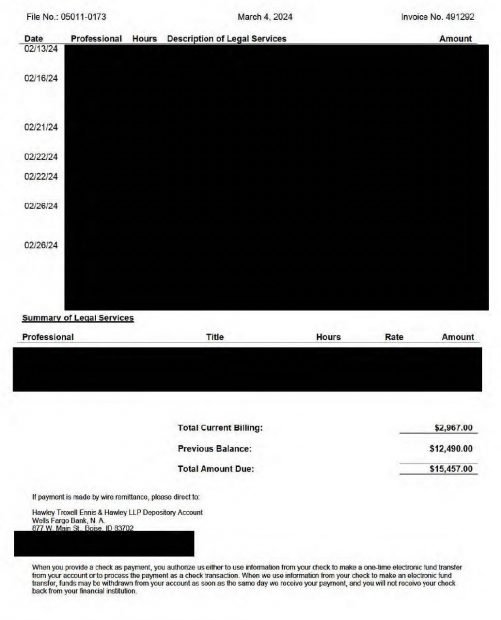For the second time this year, Idaho Education News spent its own money to see how the University of Idaho is spending public money.
EdNews requested — and paid for — six months of invoices related to the U of I’s proposed University of Phoenix purchase.
The documents were telling: EdNews learned that the U of I spent about $3.9 million through the first half of 2024, with most of the money going to law firms and consultants. EdNews’ bill for the records is likely to come to $383.37.
Idaho’s public records law allows agencies to bill for record requests, for labor costs exceeding two hours of work. Agencies are not required to bill for records. The State Board of Education, the Idaho Department of Education and Gov. Brad Little’s office routinely respond to EdNews records requests at no charge.
The U of I, however, routinely charges for records. Earlier this year, EdNews paid $414.80 for Phoenix-related invoices from 2023.
The same thing happened this time around. Here’s the timeline:
- June 18: EdNews files a follow-up to its previous records request, seeking all Phoenix-related invoices since Dec. 23, 2023.
- June 21: The U of I says it would need $118.20 to identify and gather the invoices.
- July 3: The U of I said it could cost $425.04 to review and redact the records in full.
- July 16: After paying both bills, EdNews receives 610 pages of records.
The U of I extensively blacked out these documents — citing attorney-client privilege, trade secrets and other records exemptions.
 In some cases, the records are almost completely blacked out, save for the name of the vendor, the invoice number and the cost.
In some cases, the records are almost completely blacked out, save for the name of the vendor, the invoice number and the cost.
The 610 pages also contained considerable overlap. More than 100 pages were duplicate invoices that the U of I reviewed and redacted twice — possibly billing EdNews twice in the process.
“It is entirely possible a specific invoice is represented more than once in this request because the search was not limited to an office but instead was of multiple offices,” U of I senior associate general counsel Karl Klein said in an email to EdNews.
The U of I did not try to identify and filter out the duplicates, Klein said. “Doing so would have increased labor costs.”
Because of the duplicate invoices, EdNews last week requested the U of I waive its fees. On Thursday, Klein said the U of I would refund $159.87, since the initial payments exceeded the university’s costs. (State law requires agencies to make such a refund, and when Klein released the invoices Tuesday he said the U of I “would work on a final accounting for this response and then provide it.”)
The refund would reduce the overall cost to $383.37.
